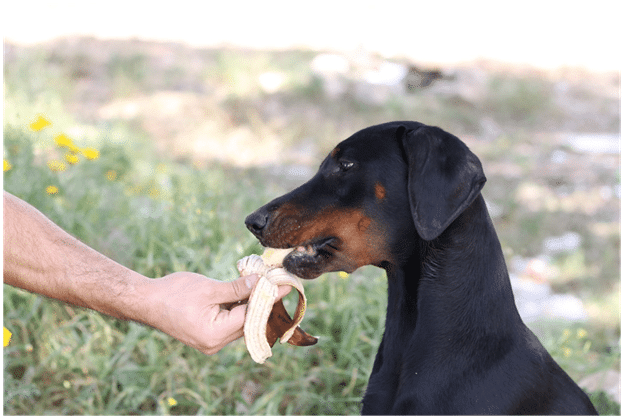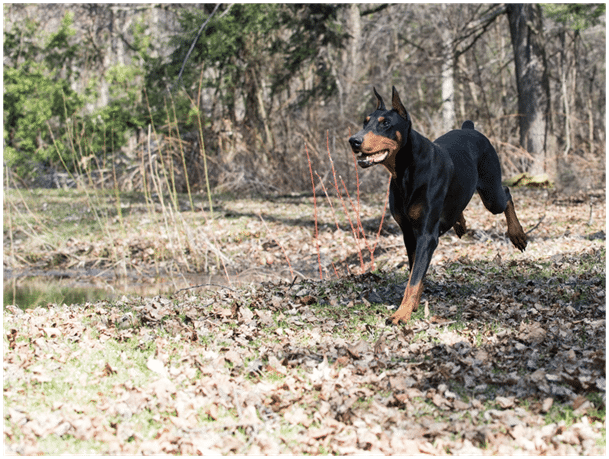Dobermans can live a relatively long life for a large breed, but their lifespan can be affected by various factors. So what are these, and how long do we expect them to live?
Dobermans live for 10-12 years on average. This is a little less than most dogs due to certain conditions they are genetically more susceptible to, including heart problems. Beyond that, they are similar to most other breeds in their need for a good diet, exercise, and companionship for a long, happy life.
Beyond the basics, we’ll get into some details of specific conditions to be aware of that Dobermans can get. We’ll also run through some tips on what you can do to ensure the best life for your Doberman. Let’s get started.
Typical Doberman Lifespan
As outlined, you can expect the Doberman life expectancy to be around 10 to 12 years. Unfortunately, the breed is known to have a few common health problems that can shorten their time with you,
Cardiomyopathy and cervical vertebral instability (CVI) are the most serious ones.
These are often genetic conditions that have been built up by decades of breeding closely related Dobermans. Unfortunately, there’s not much that can be done to prevent them now.
Common health problems
While Dobermans can live a healthy life, it is important to be aware of the more common health concerns known to the breed (as outlined below):
Cervical Vertebral Instability (Wobbler Syndrome)
Wobbler Syndrome is a neurological disorder that comes from the compression of the spinal cord.
Symptoms include:
- An unsteady gait.
- Dragging the hind legs.
- Strangely holding the neck
- Jerky steps.
As it progresses, there may come a point where your dog can’t get up or walk independently. The cause of the compression is unknown, but there are many treatments available to help dogs with wobbler syndrome.
Steroids are common in mild cases, whereas chiropractic adjustment and surgery may be needed in more severe cases.
Dilated Cardiomyopathy
Dilated Cardiomyopathy (DCM) means an enlarged heart, caused when the heart muscle becomes thicker and weaker over time. Eventually, this leads to heart failure.
“Symptoms of DCM include depression, shortness of breath, weakness, and fainting.“
A veterinarian might do an echocardiogram or an ultrasound to diagnose whether your Doberman has DCM.
Your vet will tell you the best ways to care for your dog with this condition, and regular visits can help catch the disease early and improve the Doberman lifespan. New treatments are being developed in this field.
Von Willebrand Disease
This is the most common hereditary bleeding disorder amongst dog breeds and is commonly found in Dobermans. Von Willebrand disease (vWD) is a clotting disorder that can have your Doberman bleed excessively.
“Symptoms include nosebleeds, blood in the urine, or bloody gums.“
Dogs don’t usually get nosebleeds, so any of these are a good indication something is seriously wrong.
Thankfully, vWD is rarely a fatal condition, and it has a definitive genetic test. However, dogs with vWD can still undergo necessary surgeries.
Gastric Dilatation (GDV or “Bloat”)
This is not the same kind of bloat humans get when they eat a bit too much food and pop.
Bloat can occur in all deep-chested dogs, including Dobermans. It is an emergency room situation where the stomach has twisted up, cutting off its access to either end.
This causes a build-up of gas and obstructs the flow of food and blood. It most often occurs when they overeat food too quickly.
“Symptoms include obvious pain, a distended belly, gagging but not throwing up, and excessive saliva.”
Your Doberman must be taken in for emergency care as it is fatal unless treated quickly. They may insert a tube through the dog’s throat into their stomach or use a needle to penetrate the abdomen and relieve pressure on the stomach. If these fail, they will need surgery to untwist the stomach.
Hip dysplasia
Another common issue for Dobermans is Hip Dysplasia. This is a condition where the hip socket (the ball and socket joint of the hip) doesn’t form properly, causing pain and lameness.
It’s thought to be genetic, so make sure you buy your pup from a reputable breeder who health tests their dogs.
Canine Hip Dysplasia can also be avoided by giving your Doberman pup joint supplements from an early age, as well as ensuring they get daily exercise to keep their muscles and joints healthy.
Lifestage and Milestones to Expect
| Life Stage | Age | Milestones |
| Puppyhood | 0-6 months | Eyes and ears open, teething, socialization, house training |
| Adolescence | 6-18 months | Rapid growth, increased exercise and socialization, advanced training, increase independence and stubbornness |
| Adulthood | 1-6 years | Physical growth slows, adult coat and color, ongoing socialization and training, signs of aging may start to appear |
| Senior | 7 years and older | Slow movements and activity, decreased senses, increased need for veterinary care and specialized nutrition |
Factors that impact a Doberman’s life span (and 9 things you must know!):
1. Doberman breeding and genetics
Unfortunately, this breed has some serious genetic issues. About 60% of Dobermans are affected by dilated cardiomyopathy (DCM), which can affect how long they live. The disorder’s genetic causes are unknown but do travel in Dobermans.
Part of the problem is the low genetic diversity of the Doberman’s immune system. In addition, the overall genetic relatedness of most popular means that getting rid of this disorder or other genetic diseases is very difficult.
The only viable solution for the breed is a comprehensive cross-breeding program to improve genetic diversity in the long term.
2. Healthy diet

Diet is one of the easiest things you can control to give your Doberman a greater life expectancy.
Inexpensive dog food from the grocery store is not healthy for your dog. It is often packed with filler that lacks the vitamins, protein, and nutrients they need.
Dobermans are quite agile and have graceful bodies in which they can swerve and jump exceptionally well. Dobermans need a lot of protein because they burn a lot of energy daily. Therefore, the first ingredient of your dog food should be meat, such as beef or chicken.
Avoid grains and fillers as much as possible in the food, although even good foods have some.
3. Regular Exercise

Providing plenty of exercise is another critical pillar of Doberman life expectancy.
Of course, all dogs need exercise, but Dobermans are larger dogs and will need plenty of time outdoors to run around to get their daily dose. Regular daily walks and space to run will help a lot with this.
During their puppyhood, you can spend some of their exercise time getting them trained up for adulthood. It’s essential to build good habits early.
4. Receiving proper Veterinary and Health Care
Taking your Doberman to the vet regularly is also key to maintaining good health.
Many problems can arise that you aren’t aware of, so regular checkups at the vet are the most surefire way to spot any issues before they become worse.
The vet will also get your Doberman all their necessary vaccines and monitor their weight and other health issues to ensure everything is in order.
5. Brushing their teeth
Brushing your dog’s teeth can be quite a hassle the first few times, but it is crucial for their long-term health.
Not only will their dental hygiene affect their teeth needing to come out, but the bacteria from there can cause other health issues in the long term, including becoming infected and traveling to the heart.
6. Environmental Factors
Environmental factors may include exposure to heavy metals and other poisons which can get into their system.
Ticks, worms, and fleas are also things that can affect a Doberman’s health.
Environmental factors are usually controllable, however, it can be hard to account for all of them.
7. Appropriate Mental & Emotional Stimulation
Beyond just getting them exercise, it is essential to keep your Doberman mentally and emotionally stimulated.
When on walks, letting them smell many things provides a good amount of mental challenges and stimulation. You can also get them all sorts of puzzles and toys that they’ll find stimulating.
Emotional stimulation can be as simple as showing them lots of affection, playing with them, or having them play with other dogs.
8. Socialization with other dogs and people

Socialization doesn’t necessarily increase Doberman life expectancy, but it helps reduce stress levels and improve their quality of life.
With proper socialization, a Doberman pinscher will be able to get along with all sorts of people and other dogs while still being able to guard well when an intruder comes along.
The reason it’s so important is that without socialization at a young age, your Doberman will have a hard time developing companionship beyond the core family.
They will likely spend most of their time feeling angry and threatened because they take every person and dog they pass on the street as a threat.
9. Affection and companionship
Finally, being affectionate and a good companion to your Doberman is essential to a long-lasting, great relationship between you two.
They were initially bred as intimidating guard dogs, but they need a loving family to protect them like all dog breeds.
Treating your Doberman poorly or neglecting them will not make them any more fierce as a guard dog but may shorten their life expectancy and massively hurt their quality of life.
They are natural protectors, and although their temperaments are now toned down a bit, it is still important to socialize them early.
Dobies make excellent companions and are good with kids and seniors with proper training. They can even be good with other pets in the family.
Their big challenge is around other dogs and animals and strangers. Especially if the other animal or person shows signs of aggression, they are likely to respond in kind.
For this reason, they are not recommended for first-time dog owners.
Final thoughts
While the Doberman is known for being a devoted companion, they can have a shorter life expectancy when certain health problems occur. However, with proper care and love, they can live long, happy lives with their family.
The main thing is quality of life, making sure they are happy and healthy enough to enjoy their time with family.


